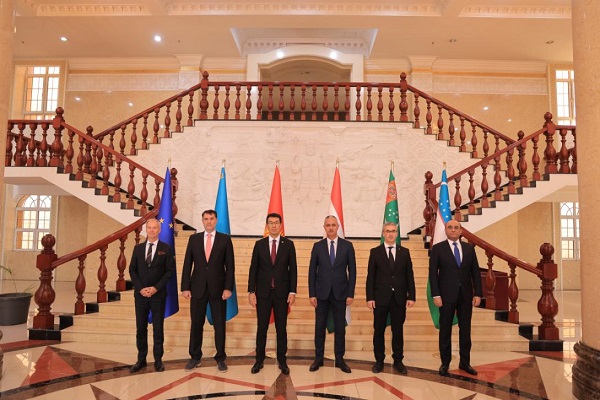The European Union (EU) and Central Asian nations—Kazakhstan, Kyrgyzstan, Tajikistan, Turkmenistan, and Uzbekistan—convened in Dushanbe, Tajikistan, for the 12th High-Level Political and Security Dialogue, reinforcing their growing strategic partnership, according to the EU Delegation to Tajikistan.
The meeting, held on 11 July, followed the 20th EU-Central Asia Ministerial Meeting in Ashgabat on 27 March 2025 and the inaugural EU-Central Asia Summit in Samarkand on 4 April 2025, which elevated relations to a strategic level.
Chaired by Olof Skoog, Deputy Secretary-General for Political Affairs at the European External Action Service, the dialogue saw participation from high-level representatives, including Kyrgyzstan’s Deputy Foreign Minister Meder Abakirov, Tajikistan’s Deputy Foreign Minister Ismatullo Nasredin, Uzbekistan’s Deputy Foreign Minister Muzaffar Madrakhimov, Kazakhstan’s Ambassador-at-Large Stanislav Vassilenko, and Turkmenistan’s Ambassador to Tajikistan Aymyrat Gochmyradov.
The discussions focused on pressing global and regional security challenges, including the situation in Afghanistan. Participants reviewed progress on the Joint Roadmap for Deepening Ties between the EU and Central Asia, particularly its security-focused Area 4.
The dialogue underscored the need for intensified cooperation to address emerging threats such as disinformation, cyber-attacks, and hybrid threats, which both regions recognize as critical to their stability and economic development amid a turbulent geopolitical landscape.
Key topics included strengthening regional cooperation on counter-terrorism, combating violent extremism, border management, illicit drug trafficking, water management, and connectivity. The EU reiterated its commitment to supporting Central Asia in tackling these challenges.
First EU-Central Asia Counterterrorism Dialogue
On 10 July, Dushanbe also hosted the inaugural EU-Central Asia Counterterrorism (CT) Dialogue, a significant step in deepening security collaboration. The meeting addressed a broad spectrum of counterterrorism issues, including threat assessments, combating radicalization, prosecuting and reintegrating returnees, and countering violent online propaganda.
The sides emphasized the importance of grounding counterterrorism efforts in the rule of law and respect for human rights.
The dialogue also explored opportunities for cooperation with third countries and in multilateral forums, fostering a broader approach to global security challenges. The EU hailed the discussions as constructive and announced that the next Counterterrorism Dialogue will take place in Brussels. ///nCa, 14 July 2025

